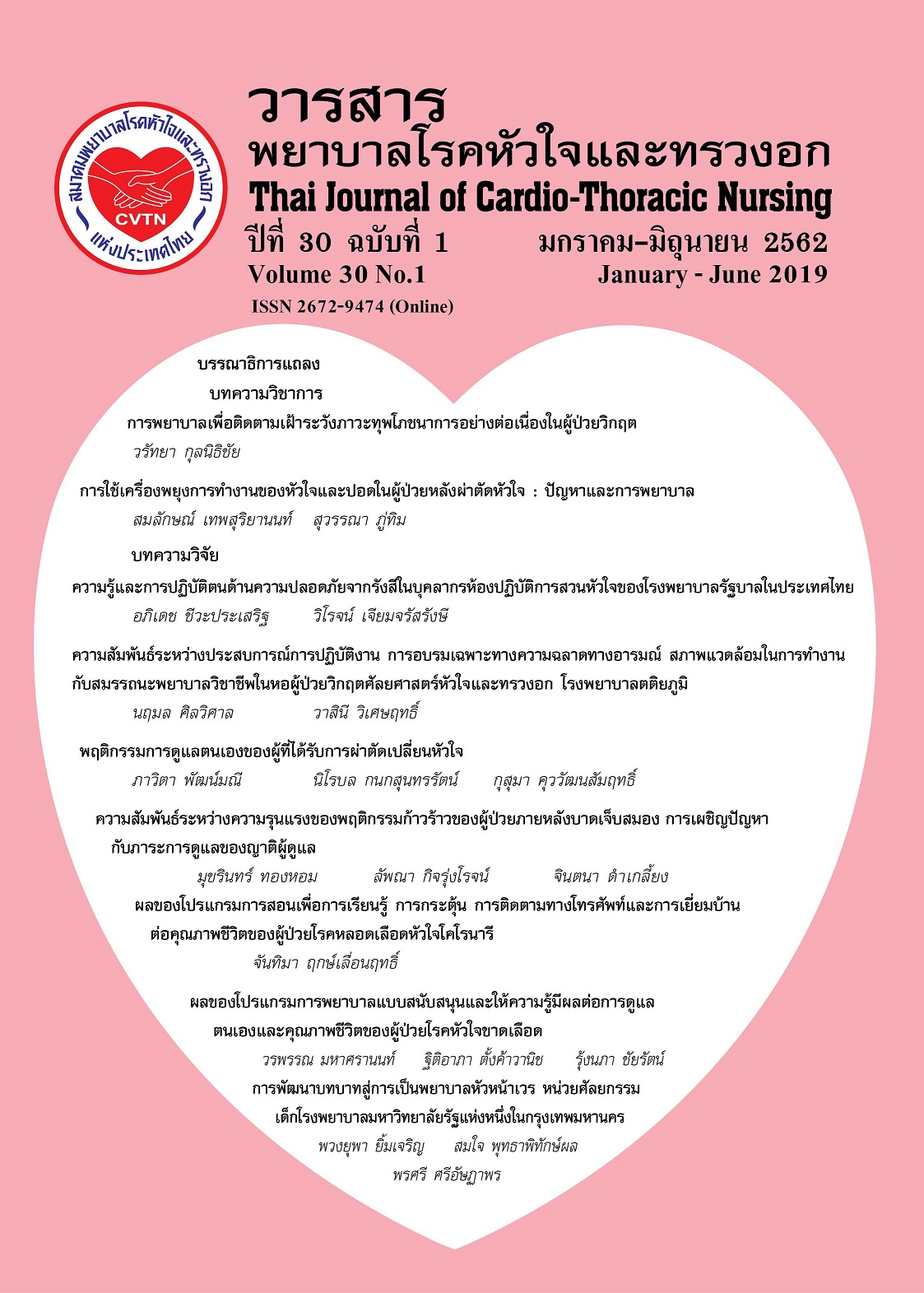พฤติกรรมการดูแลตนเองของผู้ที่ได้รับการผ่าตัดเปลี่ยนหัวใจ
คำสำคัญ:
การผ่าตัดเปลี่ยนหัวใจ, พฤติกรรมการดูแลตนเองบทคัดย่อ
การวิจัยเชิงบรรยายนี้มีวัตถุประสงค์เพื่อศึกษาพฤติกรรมการดูแลตนเองของผู้ที่ได้รับการผ่าตัดเปลี่ยนหัวใจและเปรียบเทียบพฤติกรรมการดูแลตนเองระหว่างกลุ่มหลังผ่าตัด 1-5 ปี กับ 5 ปีขึ้นไป โดยใช้แนวคิดการดูแลตนเองของโอเร็ม กลุ่มตัวอย่างเป็นผู้ที่รอดชีวิตจากการผ่าตัดเปลี่ยนหัวใจที่มาติดตามการรักษาหลังผ่าตัดหัวใจ โรงพยาบาลจุฬาลงกรณ์ สภากาชาดไทย จำนวน 35 ราย ระหว่างเดือนตุลาคม พ.ศ. 2559 ถึงเดือนกุมภาพันธ์ พ.ศ. 2560 เครื่องมือที่ใช้ในการวิจัยประกอบด้วยแบบสอบถามข้อมูลส่วนบุคคล แบบสอบถามข้อมูลสุขภาพ และแบบสอบถามพฤติกรรมการดูแลตนเองของผู้ป่วยหลังผ่าตัดเปลี่ยนหัวใจ วิเคราะห์ข้อมูลด้วยค่าร้อยละ ค่าเฉลี่ย ส่วนเบี่ยงเบนมาตรฐาน ค่ามัธยฐาน และเปรียบเทียบคะแนนพฤติกรรมการดูแลตนเองระหว่างกลุ่มหลังผ่าตัดเปลี่ยนหัวใจ 1-5 ปีและกลุ่ม 5 ปีขึ้นไป ด้วยสถิติ Mann–Whitney U test
ผลการวิจัยพบว่า กลุ่มตัวอย่างมีคะแนนพฤติกรรมการดูแลตนเองอยู่ในระดับดีมาก ทั้งโดยรวม และรายด้าน ได้แก่ ด้านการรับประทานอาหาร น้ำและเครื่องดื่ม ด้านการใช้ยา ด้านการป้องกันการติดเชื้อ ด้านการปฏิบัติกิจวัตรประจำวัน ด้านการสังเกตอาการ ด้านการจัดการอารมณ์ และด้านการมาตรวจตามนัด ยกเว้นด้านการออกกำลังกายที่มีพฤติกรรมอยู่ในระดับดี กลุ่มหลังการผ่าตัดเปลี่ยนหัวใจ 1-5 ปี และกลุ่ม 5 ปีขึ้นไปมีพฤติกรรมการดูแลตนองไม่แตกต่างกัน
ผลการศึกษาครั้งนี้แสดงให้เห็นว่า ผู้ที่ได้รับการผ่าตัดเปลี่ยนหัวใจมีพฤติกรรมดูแลตนเองที่ดีมาก พยาบาลควรส่งเสริมให้ผู้ป่วยคงไว้ซึ่งพฤติกรรมดูแลตนเองที่ดี เพื่อให้มีชีวิตยืนยาวต่อไป
เอกสารอ้างอิง
2. Duangjai P. A study of lifestyle in heart tranaplant patient. [Master Thesis of Nursing Science]. Bangkok: Mahidol University; 1997. (in Thai).
3. Luengthada N. Two Decades of Organ Transplantation in Ramathibodi Hospital: Perioperative Nurse’s Roles in preparing Organ Harvesting. Ramathibodi Nursing Journal. 2015; 21(1): 12-20.
4. Chittmittrapap S, Naveejareon P. Text book of surgery. 11st. Ed. Bangkok:Chulalongkorn University Printing House; 2012. (in Thai).
5. Ahren TS, Prentice D, Kleinpell RM. Critical care nursing certification preparation, Review, and practice exams. 6th. Ed. New York: McGraw Hill; 2011.
6. Thai Red Cross organ donation center. 2015. [cited February 14, 2015]. Available from:https://www.organdonate.in.th/wp-content/uploads/2014/10/guideline.pdf. (in Thai).
7. DiNella J, Bowman J. Heart transplantation. Crit Care Nurs Clin North Am. 2011. 23(3): 471-79.
8. Grady K, Kathleen L, et al. Symptom frequency and distress from 5 to 10 years after heart transplantation. J. Heart Lung Transplant. 2009; 28(8): 759-68.
9. Biefer H, Rodriguez C, et al. Surviving 20 years after heart transplantation: a success story. Ann Thorac Surg. 2014; 97(2): 499-504.
10. Ivarsson B, Ekmehag B, Sjöberg T. Patients’ experiences of information and support during the first six months after heart or lung transplantation. Eur J Cardiovasc Nurs. 2013; 12(4): 400-406.
11. Chanpradab K. Quality of life of Heart transpaltation recipients. [Master Thesis of Nursing Science]. Bangkok: Chulalongkorn University; 1996. (in Thai).
12. Siwińska J, Lesiak-Kalukin M, Przybyłowski P, Sadowski J. Health behavior of patients after heart transplantation as an indicator of patient compliance. Transplant Proc. 2011; 43(8): 3086-88.
13. Segura-Saint-Gerons R, Segura-Saint-Gerons C, Alcántara-Luque R, et al. Perceived influence of oral health upon quality of life in heart transplant patients. Medicina oral, patologia oral y cirugia bucal. 2012; 17(3): 409-414.
14. Tseng H, Shin J, Yang C, Shih J, Wang S. Factors contributing to poor sleep quality as perceived by heart transplant recipients in Taiwan. Transplant Proc. 2014; 46: 903–6.
15. Leewattana T, Isaramalai S, Punthusena C. Basic conditioning factors, self-care agency, and quality of life of patients following open heart surgery. Songkla Med J. 2008; 26(2): 141-150. (in Thai).
16. Orem DE. Nursing: Concepts of practice. 6th Ed. St. Louis, MO: C.V. Mosby; 2001.
17. Eric WC. Transformed score I: Percentile ranks. Using and interpreting statistics. Missouri: Mosby; 2007.
ดาวน์โหลด
เผยแพร่แล้ว
รูปแบบการอ้างอิง
ฉบับ
ประเภทบทความ
สัญญาอนุญาต
บทความนี้ยังไม่เคยตีพิมพ์หรืออยู่ในระหว่างส่งไปตีพิมพ์ในวารสารอื่น ๆ มาก่อน และกองบรรณาธิการขอสงวนสิทธิ์ในการตรวจทาน และแก้ไขต้นฉบับตามเกณฑ์ของวารสาร ในกรณีที่เรื่องของท่านได้ได้รับการตีพิมพ์ในวารสารฉบับนี้ถือว่าเป็น ลิขสิทธิ์ของวารสารพยาบาลโรคหัวใจและทรวงอก






